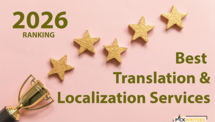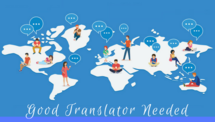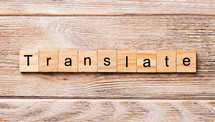Bad Translations And How To Avoid Them
The need for documents or website localization arises for almost every business nowadays, yet some are still surprised to hear that bad translations may be the first step down a dangerous path, which can lead a company to great financial losses, or worse.
Sometimes a mistake in interpretation of text is capable to cause not just a minor nuisance, but completely ruin business, harm someone’s health, or even become a reason for legal action towards your company.
However serious the repercussions of poorly completed localization may be, there is no need for panic, as in this article we will provide you with all information, necessary for you to be able to recognize translation problems and stay away from them!
What Does “Poor Translation” Really Mean?
Adapting text for different languages correctly is way trickier than people think. There are obvious issues that people pick up on, such as spelling or grammar mistakes, but there are lesser-known errors that completely butcher your text.
Curiously, even translation without any mistakes can be a bad one. Many factors may have their contribution – misinterpreting words’ meaning, lack of diversity in speech, misuse of punctuation, which results in an unwanted shift in meaning, etc.
Mishaps in localization are capable to completely spoil the reputation of your company and make you lose profit at the same time.
Let’s paint a mental picture together – say that you want to release some marketing materials regarding a new product. Countless man-hours and much money were spent developing this product, manufacturing and testing it, preparing the launch. Brilliant team of designers and content-creators put together marketing materials that’ll make sales skyrocket! But how do you spread word about new products internationally? You need to publish marketing materials in several foreign languages, which you have no experience with.
That is when translation problems may jeopardize everything.
If the final text is even slightly off-putting, it’ll probably make potential foreign consumers smile and not take your offer or brand seriously. In this scenario they may lose interest in working with your company and, although you put much effort into your product, they may opt for another brand that conveyed information about the product is a better way. That does sound concerning, doesn’t it?
Read also: Reviews of the best Italian translation services to help you receive accurate translations.
How to Know if Translation is Bad?
These are few tell-tale signs that interpreted text could do with some improving:
- Mistakes and typos (spelling, grammar or punctuation errors, improper word usage, etc.);
- Wrong word order is a dead giveaway of bad translator who has poor knowledge of language, was inattentive and didn’t proofread the text, or was using a program;
- Being overly literal will easily expose lack of experience;
- One must remember that style and “mood” of original text should be preserved, however in bad translation the voice of the author sometimes gets lost;
- Worse possible mistakes in translation are loss of original meaning of entire text and its cousin – loss of sense. The latter happens, for example, when there is a large sentence to be translated, with the translator concentrating on form rather than meaning.
7 Ways Bad Translations Hurt Your Brand
1. Is your brand a joke?
However mild the effect on sales and brand recognition may seem, poorly done localization can really stir their company’s progression through a market the wrong way. Especially so, if a company is entering a new foreign market, which is most often the scenario in which translation problems have the most negative payoff.
If you are looking to make a good impression on your new potential clients, taking time and effort in order to reach them in a way that is culturally appropriate, mistake-free and locally acceptable is crucial. Another way, your brand or company may be perceived as careless, laughable, or even worse – as offensive and culturally-insensitive.
2. Pricy failure
There are some instances where having poor translation wouldn’t be that dangerous, like posting a mistranslated blog article in the sphere of entertainment or allowing a couple of mistakes in localization of your website.
But in certain cases, it is crucial to get it right, or else the effects may be truly business-crushing. For example, we refer to some areas of expertise as “high-risk” ones – like law or medicine.
What happens if there is an error in translation? A single mistake, missed or misplaced punctuation, use of wrong word will possibly lead to thousand-dollar fines.
Useful information: Interpreting documents isn’t easy, yet the result must be immaculate. Feel free to safely use these business document translation services.
3. Account for your accounting
Always triple-check the numbers! Date and number formats vary greatly in different countries, and the mishaps can be truly costly.

4. Forcible rebranding
If a serious mistake finds its way into your company’s commercial printable materials, merchandize, packaging, etc. you mind be forced to spend extra time and money for complete relaunch and rebranding, which is of course doable, however pricey, but yet you only got a single chance to make good first impression.
5. Lost revenue
That’s right, translation problems will make you lose customers and therefore miss out on revenue you would have otherwise received. Many already noticed direct correlation between mistakes and lost profit – once they’re fixed, revenue is often doubled!
6. Not user-friendly
When people use online platforms to shop or for other purposes, the main factor that everyone notices at once is how comfortable and “natural” it feels to interact with such a platform. Poor translation often has as much of an effect as inconvenient website structure or poor-quality graphic content.
7. Bad for SEO
How are you supposed to build your brand up and reach good sales if your website is literally invisible? Bad translations into English, especially machine-done content, eventually blow up in your face and lead to low rankings of your website, meaning that it’ll be very hard for your potential buyers to find it.
How to Avoid this Damage
The answer is straightforward – take your time, do your research and enlist help of an experienced professional. You’ll be entrusting someone with your company’s reputation and success, so your choice should be well-considered.
When localizing your business for foreign customers many factors should be taken into account, which professional translator is accustomed to, so as not to be culturally-insensitive and show your content the appropriate way.
Useful information: enlist the help of these web localization services for optimal results.
Translation Quality Assurance: What Can You Do?
It is basically a process of verifying if the translation is in fact good. There are a lot more steps to the process of adapting information to a different language that one might think – starting with research, subject analysis, preparation, and text interpretation itself to proofreading and editing in order to eliminate the possibility of wrong translation.
Taking these steps helps ensure that the finished product is of highest possible quality and exceeds expectations of both the client and his future customers.
Unfortunately, many online services and independent professionals claim that their service is top-notch, when in fact, if test, they fail to produce a satisfactory result.
We would strongly suggest doing your research about different types of translations and language service providers before you enlist their help with your project. To help you out, here are some trustworthy services that were reviewed and verified as good service providers: these English to Arabic translation services can help you out with your Western Asian and Northern African market, these services translate to Japanese easily, and here are some great options for your Spanish translation.
So Bad It’s Good
It might all sound very serious and challenging, so here are some famous translation fails in advertising that will cheer you up, while hopefully being a good example of what not to do!
- Schweppes – a popular Swiss brand of tonic water didn’t quite appeal to Italians, when a simple error transformed them from “Schweppes tonic water” into “Schweppes toilet water”! Doesn’t sound like much of a treat now, does it?
- McDonald's – there are not many people in the world who haven't heard of this ultra-popular fast-food chain, hoverer, when they introduced their famous Big Mac burger to the French, it was interpreted as “Big Pimp” instead. Who would’ve guessed that such a massive company could mess up like this?
- Marvel Entertainment – Yes, you heard right! Even a giant like Marvel sometimes succumbs to bad translation. When their famous “Avengers: Infinity War” hit Korean theatres, many fans were outraged by several mistakes that made their experience way less enjoyable. Fans felt mistreated to the point where they filed a petition for Marvel to fire an employee that did the Korean subtitles for the movie. That is a huge fail that Thanos can’t just snap away!
Read also: here are some more localization fails that will make you giggle.
Now that you have taken a peek into possible consequences of bad translations, we urge you to up your game! We at pickwriters.com review translation services for you, so you can choose the best and most suitable one for your needs.













